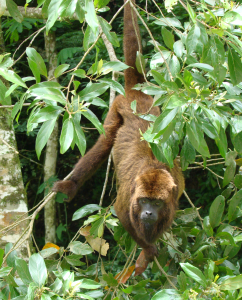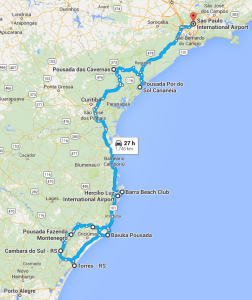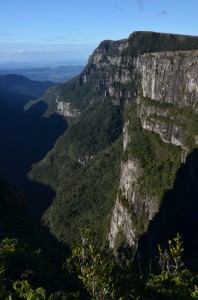May 2016
VOLCANOES, RAIN FORESTS, CAVES, AND BEACHES IN BRAZIL
General information
Instructors:
Guil Gualda
g.gualda@vanderbilt.edu
https://my.vanderbilt.edu/ggualda
Malu Jorge
malu.jorge@vanderbilt.edu
https://my.vanderbilt.edu/malujorge/
Teaching Assistant:
Lydia Harmon
lydia.j.harmon@vanderbilt.edu
Email list:
To sign up to receive updates and additional information by email, fill out form here:
Google form link
Scope
In this course, we study Earth and Environmental processes and systems in the field, with an emphasis on field methods. In 2016, the course will be held in Brazil, which will give us the opportunity to study a variety of topics in the Earth and Environmental Sciences, including past volcanic activity, surface geomorphology, cave geology, ecology of the rain forest, biological conservation, and human dimensions of conservation.
Motivation and goals
Volcanoes, Caves, and Geomorphology
Rocks preserve the most extensive record of the evolution of the planet, from which we are able to retrace Earth’s history over 4.5 billion years. Field geology plays a particularly important role in decoding this complex record, but its interpretation requires proper understanding of geologic processes and of the methods of field geology. In this course, we will learn the methods of field geology and will apply them to understand geologic processes related to the breakup of South America and Africa and the opening of the South Atlantic Ocean some 130 million years ago.
During the course, we will study volcanic supereruptions and their deposits, cave geology and associated underground water systems, and landform evolution since the opening of the South Atlantic Ocean.
Part of the fieldwork performed during the course will directly contribute to an active NSF-funded project focusing on the evolution of supereruption-forming magma bodies, which includes Gualda and his graduate students.

Ecology and Conservation Biology
The Brazilian Atlantic rainforest extends from the north to south along the coast of Brazil, and surrounds some of the most famous South American cities, such as Rio de Janeiro and São Paulo. It encompasses more than 50,000 species of animals and plants, a biodiversity similar to that of the Amazon. It is also highly threatened as almost 90% of its area has been converted into crops and cities.
In this part of the course, students will learn important aspects of tropical ecology, biodiversity, conservation, and management in direct contact with one of the most diverse and threatened rainforests in the world. They will get to participate in ongoing research efforts of Jorge and her students.
Program
 The course will start in Florianópolis on May 9 and finish in São Paulo on June 3, 2016. Our visit will be based in a few different areas in Brazil over the length of the course, and the topical focus will change accordingly:
The course will start in Florianópolis on May 9 and finish in São Paulo on June 3, 2016. Our visit will be based in a few different areas in Brazil over the length of the course, and the topical focus will change accordingly:
FAROL DE SANTA MARTA (Santa Catarina State):
Introduction to geology: rock types, plate tectonics, magmatism, sedimentation, introduction to field methods
SERRA GERAL (Santa Catarina and Rio Grande do Sul States):
a. Evolution of the environment over time: from oceans to deserts to volcanic landscapes
b. Volcanism leading to the opening of the South Atlantic Ocean: styles of volcanism, evolution of magma bodies at depth, magma eruption processes
c. Field research of supereruption deposits, in connection with NSF-funded CAREER project on the evolution of magma bodies that lead to supereruptions
FLORIANÓPOLIS (Santa Catarina State):
Free days mid-course at a island city with beautiful beaches and plenty of activities
ALTO RIBEIRA CAVE DISTRICT (São Paulo State):
a. Evolution of karstic landscapes, cave development, and subterranean water systems
b. Highland Rain forests in São Paulo state
c. Human dimensions of conservation, including the history of establishment of a state park and impact on local communities
ILHA DO CARDOSO (São Paulo State):
a. Rain forests and other biomes of coastal environments
b. Forest fragmentation and conservation issues
c. Human-environment interactions in a protected area
Evaluation
Course evaluation will be based on participation, field exercises (outcrop descriptions, geologic cross-sections and maps), and oral presentations.
Requisites
There are no prerequisites for this course. Students with all levels of expertise in geology and biology are encouraged to apply. Activities will be adjusted to take into account prior experience and course-work.
Credits
3 credit hours. This course is listed as MNS in AXLE.
Expenses
The course fee includes tuition, lodging, transportation, most meals (depending on the location), and entrance fees to National and State Parks. It does not include airfare from Nashville to Florianópolis or from São Paulo to Nashville, a Brazilian tourist visa, transportation from and to airports, regular meals in major cities, and incidental expenses.
Financial support
For information on the Global Summer Fellowship Program, offering scholarships of up to $8,500, consult GEO: www.vanderbilt.edu/studyabroad
Last updated: Nov 08, 2015



Connect with Vanderbilt
©2026 Vanderbilt University ·
Site Development: University Web Communications